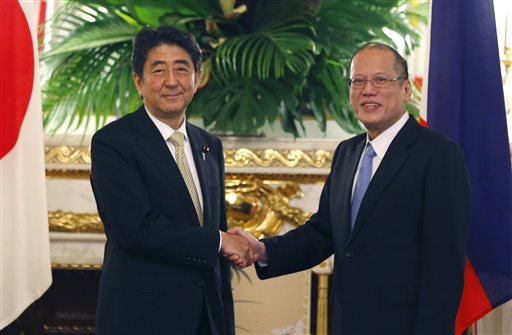
Philippine President Benigno Aquino III, right, shakes hands with Japanese Prime Minister Shinzo Abe prior to their meeting at Akasaka Palace state guesthouse in Tokyo Thursday, June 4, 2015. AP Photo
The Philippines on Saturday hailed the passage of the Japan security bill that will allow the Japanese armed forces to defend allies like the Philippines when under attack.
Foreign Affairs Secretary Albert del Rosario issued a statement welcoming the move which had earlier reaped controversies in the Japanese soil, but was widely believed to be beneficial to the Philippines amid the growing tensions in the South China Sea.
The Philippines, which has a military regarded as the weakest in Southeast Asia, has been locked in an escalating dispute with China over claims in the South China Sea.
READ: PH welcomes Japan’s new law allowing its troops to fight overseas
Japan is a strategic partner of the Philippines, second to the United States, the country’s only treaty ally.
“The Philippines welcomes the passage of legislation on national security by the National Diet of Japan,” Del Rosario said in a statement.
“We look forward to efforts that strengthen our Strategic Partnership with Japan and those that would contribute further to shared goals of greater peace, stability, and mutual prosperity in the international community,” he added.
READ: Japan boosts military’s role, passes bill allowing troops abroad
Japan’s parliament passed into law on Saturday the security bill despite strong opposition from some quarters.
On Thursday, a scuffle broke out at the Japan’s parliament when members of the opposition attempted to stop the vote of the parliament’s legislative committee.
The vote was a step for the bill to go to the upper house of parliament for final approval. Niña P. Calleja/RAM


